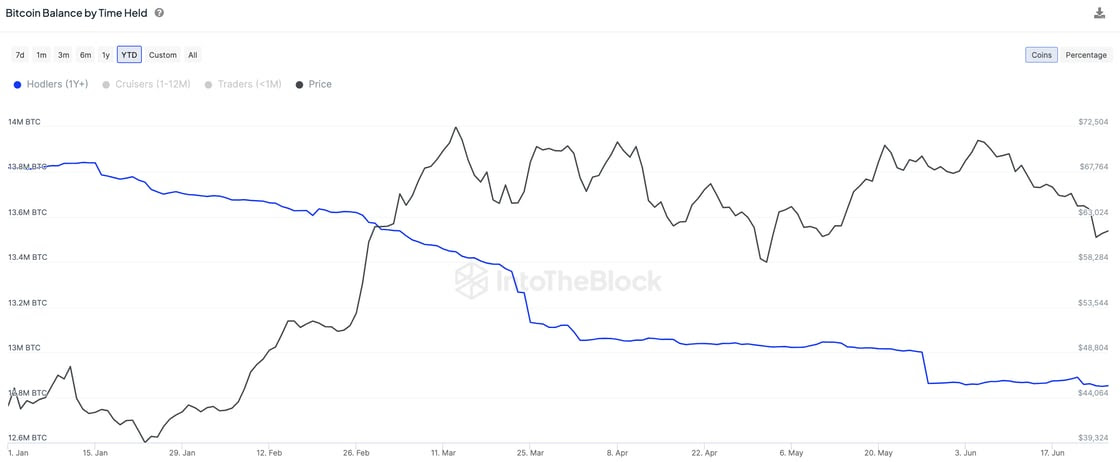Market Tremors: $10 Billion in Bitcoin Dumped in May Alone, What Does This Signal?
May 2024 emerges as a pivotal month for Bitcoin, witnessing a notable amount of liquidation by long-term holders. Blockchain analytics firm IntoTheBlock highlighted a sell-off totaling roughly $10 billion, equivalent to approximately 160,000 BTC. This trend marked a significant departure from the usual holding patterns seen among long-term investors, who typically help stabilize Bitcoin prices by holding through volatility. Related Reading: Will Bitcoin Continue Dumping? This Analyst Thinks So, Here’s Why Bitcoin Stability at Risk? Notably, these long-term Bitcoin holders, also known as the stalwarts of the Bitcoin community, have traditionally served as a bulwark against market turbulence, with their investment decisions often reflecting a steadfast belief in the cryptocurrency’s long-term value. The change in their behavior in May signals a broader sentiment shift within the market. The scale of this sell-off not only underscores a potential loss of faith or a strategic financial recalibration but also poses serious implications for market liquidity and price stability. IntoTheBlock’s analysis further reveals a slowdown in June, with “only” 40,000 BTC sold, suggesting that while the fevered pace of May’s sell-offs has cooled, the liquidation trend persists. Such continued selling activity contributes to ongoing price pressures, challenging the resilience of Bitcoin’s market value. The repercussions of these large-scale disposals extend beyond simple transactional impacts. Bitcoin’s price has struggled to find firm footing above the $61,000 mark, with frequent fluctuations testing the resolve of both traders and analysts. Despite brief spikes in trading activity—such as a surge to $62,314 earlier today—Bitcoin’s price has retracted to around $60,843, reflecting a 1.3% decrease over the past day. Adjusting to New Realities Adding to the complexity is the significant reduction in Bitcoin mining activity. After the Halving event in April, which reduced mining rewards by half, there has been a marked decrease in mining output. Data from CryptoQuant indicates a near 90% drop in miner withdrawals, suggesting a drastic cut in selling pressure from this quarter. The reduced mining activity is largely due to decreased profitability, prompting miners to scale back operations and sell fewer coins. This adjustment might normally suggest a tightening of supply and potential upward pressure on prices, yet the overarching market sentiment remains bearish. CryptoQuant analysis points to a state of “capitulation” among miners, a condition supported by the Hash Ribbons metric indicating that the short-term mining hash rate has fallen below its longer-term trend. Typically, traders consider such signals bullish, indicating potential buying opportunities. However, the current market digestion of the recent heavy sell-offs by long-term holders and the reduction in mining output paints a more nuanced picture. Related Reading: Bitcoin To Hit New Heights? Analyst Predicts 10x Growth In Few Years — Here’s How The convergence of these factors might yet forge a pathway out of the current bearish climate, setting the stage for a potential market recovery. Featured image created with DALL-E, Chart from TradingView

May 2024 emerges as a pivotal month for Bitcoin, witnessing a notable amount of liquidation by long-term holders. Blockchain analytics firm IntoTheBlock highlighted a sell-off totaling roughly $10 billion, equivalent to approximately 160,000 BTC.
This trend marked a significant departure from the usual holding patterns seen among long-term investors, who typically help stabilize Bitcoin prices by holding through volatility.
Bitcoin Stability at Risk?
Notably, these long-term Bitcoin holders, also known as the stalwarts of the Bitcoin community, have traditionally served as a bulwark against market turbulence, with their investment decisions often reflecting a steadfast belief in the cryptocurrency’s long-term value.
The change in their behavior in May signals a broader sentiment shift within the market. The scale of this sell-off not only underscores a potential loss of faith or a strategic financial recalibration but also poses serious implications for market liquidity and price stability.
IntoTheBlock’s analysis further reveals a slowdown in June, with “only” 40,000 BTC sold, suggesting that while the fevered pace of May’s sell-offs has cooled, the liquidation trend persists. Such continued selling activity contributes to ongoing price pressures, challenging the resilience of Bitcoin’s market value.
The repercussions of these large-scale disposals extend beyond simple transactional impacts. Bitcoin’s price has struggled to find firm footing above the $61,000 mark, with frequent fluctuations testing the resolve of both traders and analysts.
Despite brief spikes in trading activity—such as a surge to $62,314 earlier today—Bitcoin’s price has retracted to around $60,843, reflecting a 1.3% decrease over the past day.
Adjusting to New Realities
Adding to the complexity is the significant reduction in Bitcoin mining activity. After the Halving event in April, which reduced mining rewards by half, there has been a marked decrease in mining output.
Data from CryptoQuant indicates a near 90% drop in miner withdrawals, suggesting a drastic cut in selling pressure from this quarter. The reduced mining activity is largely due to decreased profitability, prompting miners to scale back operations and sell fewer coins.

This adjustment might normally suggest a tightening of supply and potential upward pressure on prices, yet the overarching market sentiment remains bearish.
CryptoQuant analysis points to a state of “capitulation” among miners, a condition supported by the Hash Ribbons metric indicating that the short-term mining hash rate has fallen below its longer-term trend.
Typically, traders consider such signals bullish, indicating potential buying opportunities. However, the current market digestion of the recent heavy sell-offs by long-term holders and the reduction in mining output paints a more nuanced picture.
The convergence of these factors might yet forge a pathway out of the current bearish climate, setting the stage for a potential market recovery.
Featured image created with DALL-E, Chart from TradingView
What's Your Reaction?





















